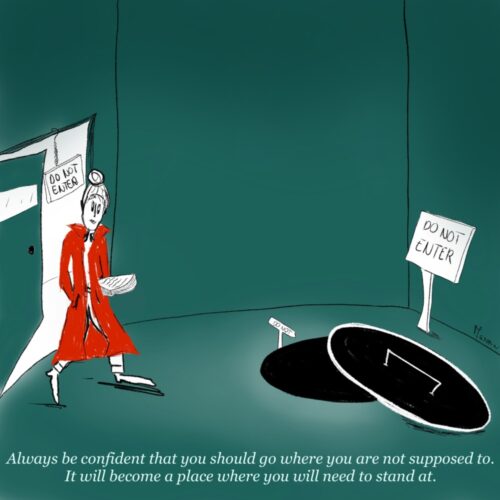The Guerrilla Girls Still Behaving Badly 36 Years Later
By Shayna Gee
sgee23@mail.ccsf.edu
Legendary disruptors of the art world, the Guerrilla Girls are a collective of artist-activists exposing gender and racial discrimination in the arts. The self-proclaimed “professional complainers” began their careers “behaving badly” in 1985, carrying posters and glue to post around the city.
“We were just a bunch of ragtag artists in New York who would sneak around the streets in the middle of the night,” said Guerrilla Girl Frida Kahlo.
Masked in guerrilla faces for anonymity, each Guerrilla Girl takes on a dead woman artist’s name as a pseudonym. Their campaigns have largely focused on challenging the political systems of power that corrupt the arts.
“Guerrilla Girls: The Art of Behaving Badly” is the first book to document their campaigns from the mid-80s to present day. Written by the Guerrilla Girls themselves, the book includes a large collection of roaring graphics and statements from public demonstrations to billboards to gallery exhibitions.
San Francisco Public Library’s (SFPL’s) 16th annual One City One Book campaign hosts a broad range of virtual events throughout March and April. Of the many events, Guerrilla Girls Kahlo and Kathe Kollwitz made an appearance on March 24 to discuss their book and legacy at a panel co-hosted by SFPL and in partnership with their publisher, Chronicle Books.

SFPL kicked off the event with a quote by author and social activist bell hooks: “The work of the Guerrilla Girls represents the most powerful political union between theory and practice.”
“The art that was admired and successful is usually about the white male experience,” Kahlo said. “There’s a huge glass ceiling for women and people of color in both the art market and the museum structure. Rarely do you see a woman rise to be a director but that’s changing.”
Kahlo and Kollwitz exhibited a slide displaying one of their earliest posters from 1986 that called out tokenism and served as a “public service message” from the Guerrilla Girls. In black ink with asterisks citing galleries, it read: “ONLY 4 COMMERCIAL GALLERIES IN N.Y. SHOW BLACK WOMEN.* ONLY 1 SHOWS MORE THAN 1.**”
The Guerrilla Girls’ provocative graphics have drawn the attention of well-esteemed museums and art curators whom they’ve called out through their own art, such as the Museum of Modern Art (MOMA).
Written in their campaign statements and fashioned by their guerrilla masks, the Guerrilla Girls’s weapon of choice? Humor. They use humor as a way to reach people with differing opinions and “to possibly change peoples’ minds,” Kollwitz said.
Having done hundreds of projects over more than 35 years, “we’ve refined our critiques and techniques but we always try to do something that is surprising and something that we hope is unforgettable,” Kollwitz said.
In recent projects, the Guerrilla Girls have been interested in museum directors and board members.
In 2018, The Guerrilla Girls began working with global publisher Phaidon Press Ltd. to publish their book “The Art of Behaving Badly.” One year into the making of the book, news had surfaced that Leon Black, the owner of Phaidon Press and chairman of the board at MOMA, “had a long and unexplained relationship with Jeffrey Esptein (convicted sex offender),” Kahlo said.
According to multiple news outlets, Black paid Epstein $158 million for alleged tax advice.
After breaking the contract with Phaidon Press, the Guerrilla Girls took a deeper dive into Black and his connections. According to the Apollo Global Management press release on March 22, 2021, Black had stepped down from his role as CEO months earlier than his expected departure in July.
“It’s so interesting that the MOMA has not yet asked him to leave the board of directors and that the financial institutions had to act on their ethics before the MOMA,” Kahlo said.
On the same week of the SFPL panel, an anonymous tip told the New York Times that Black announced that he does not plan to renew his position as chairman of the MOMA.

With the Guerrilla Girls, there is no skipping around the issues of patriarchal bias and discrimination. Their art gets to the point and they do it in a way that is unforgettable. They demand the art museums and collectors to examine their own artist representation because museums hold history and therefore shape narrative.
“I don’t think anyone would say you could write the history of art without the voices of women and artists of color,” Kahlo said.
The Guerrilla Girls departed the panel with their motto: “Do one thing. If it works, do one thing. If it works, do another. If it doesn’t, do it anyway. Just keep chipping.”
